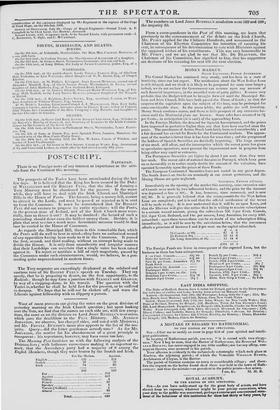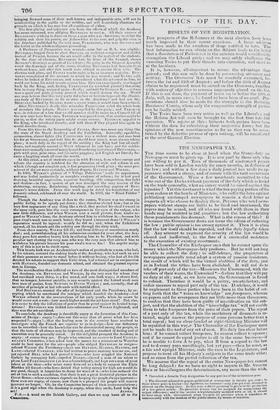ROYAL ACADEMY.
TO THE EDITOR OF THE SPECTATOR.
SIR—As you have nobly.stood tip for the great body of artists, and have shrunk from no exposure, whatever might be your private connexions, when your duty to the public was concerned, perhaps a concise and concentrated state- ment of the behaviour of this institution for these last thirty or forty years, by
bringing forward some of their well-known and intlisputahle acts, will not be uninteresting to the public or the nobility, and will beautifully illustrate the grounds on which it has now It all confidence of either.
The first glaring and infamous art, fi om the effects of which the Academy has never recovered, was oldigites REYNOLDS to resin n. All their excuses of Rs v Notns's wishing to foyers on them a man who was tbnnxinus, tO oblige the nobility and show his power, arc .thisc—filse to the root, and palpahle even in the brochure published by the vary man, FA ittNuToN, who was the caive and the leader in the whole malignant proceeding.
A Professor of Perspective was wanted—none but an R. A. was eligible: 1 Ey N wars begged them to elect Buxom I. an architect competent and skilful, instead of FUSELI, because the ant would slithr by the neglect of the students. At the tune of election, Rev Norms had, by leave of the Council, shown EONOSII'S drawings as proofs of his t dents ; the party in the General Assembly voted the drawings out of the room, thinking R F: V HO tns had brought them without leave, and after this insillt were obliged to rescind their vote. The election took place, and Fesrat was brought in by an immense majority. RE Y• stouts complained of the manner in which he was treated ; and BANKS said, when he looked at REYNOLDS. and IVIDelilltered ghat the art owed to him, he could not bible his mind to vote against him. REY.i:m,ps resigned ; was begged back by the King, and, finding FA RI NGTON (il WEVtelleil painter) thwarting him in every thing, resigned again—finally ; and told Sir GEORGE B—T there was a spirit and party geining groom ! would destroy the int. Would any man believe that this very party did refuse or hesitate to permit the illustri- ous body of Thy rrosns to lie in state in the Academy? and had not Mr. IUETCA LF, backed by Be HEE, wrote a severe letter, it would have been refused. After REA sorsis's death, this miserable FA siNcroN ruled the whole body of members like infants. BA R !CY was expelled by this panty; and Tic s:sita was, in defiance of a law that no old member shall be twice on it Council till all the new ones have been once, Tit ES tun M was passed over, that another might be put in, so that the ruling pat ty might secure victory. Tit Esti.% appegied to the King, who interfered directly, and told them if they plagued him again he would dissolve them.
From this time to the Keepership of FUSEM, there was never any thing like the state of the Royal Academy and the Exhibition. Internally, squabbles, animosities, almost fights (for FARM:TON was a violent man, and once bent his fist at STOTH A RD, and told him he shouhl hear more), were always taking place ; it sunk daily in the regard of the nobility ; the King had lost all confi- dence, and regularly sneered at Wrsr whenever lie saw him ; and the exhibi- tions were annually a mass of tuargylp and floundei Mg imitations of RPY NOLDS,— girls with pigs, prize oxen, and fivourite puppies ; and English art literally be- came a laughing-stock all over the world. At this crisis, a set of students came in with Fusers, from whose energy and talents the country is indebted for the alteration of style and refinan in art, which (though not complete ytt, is fast progressing) took place ; the most pro- minent of the set were certainly, without dispute, 11A YDON MI WILKIE. In ISM, Wrsares picture of " Village Politicians" made its appearance, and was hailed instinctively as complete evidence of reform ; for it had emid drawing, beautiful expression, exquisite handling, nide composition, fine light and shadow—in fact, a system of art was developed the very reverse of the slobbering, scraping, floundering, bungling, and scrawling colliers of HEY- NoLDs's worse defects. From this work may be dated the foundation of our domestic school, cekbrated all over the world. In 1807, the " Blind Fiddler " followed.
Though the Academy was shaken to the centre, WILKIE was too strong in public feeling to be openly put down ; they therefore elected him ; but at the very first appearance of any thing like a rival, they pushed his rival forward in the same rank, gave him the same consequence in the eyes of the vulgar, who saw little difference, and when WILKIE sent a small picture, from tender re- gard to WILK /E'S fame, the Academy advised him to withdraw it,—because his poor rival's work was so much better, they feared (innocent dears !) Wits: Ws reputation would be injured : weakly he did so ; and, when the Exhibition opened, all his friends and the nobility saw through the dirty trick.
From sheer anxiety, WILKIE fell ill ; and from delicacy of constitution nearly died; and, notwithstanding all his submissive conduct for years after, the Aca- demy gave him another hearty kick in refusing him to be President, and with peculiar tact electing the eery man who was the very ntan that advised him to withdraw his picture because his poor rival's was so line ! The angelic nialig- 'sky of this is not to he dwelt upon. This hearty kick was an Academician's notion of gratitude to a man, who had, by his talents, restored the sinking funds of the Academy, who had such an awe of their presence as never to stand before it without booing, who had all his life devoted his talents to support their Exhibition, bad reformed art in conjunction with HAvnoN, founded our domestic school, and obtained the greatest reputa- tion in Europe.
The mortification thus inflicted on two of the most distinguished members of the Academy, viz. RzyNosns, and Witiriz, by the -very men for whom they had sacrificed every thing, is a fine moral, and cuts both ways ; it shows first, that no temper, however amiable, is any security against the hatred weak men bear men of genius, from NEWTON to DAVID WILK IE ; and, secondly, that all sacrifice of principle at last rebounds with tenfold effect. Had REYNOLDS resisted the offer of knighthood and the Presidency, by ac- cepting which he sanctioned the intrigue which founded the Academy—had Wirstis adhered to the asseverations of his early youth, when he swore he would never ask a tote—how mud, higher would the art have stood ! But, alas, it is easier to defy the inflictions of power than be proof against its honied temp- tations ! REYNOLDS was tickled into submission and WILKIE frightened, and thus was the art sacrificed.
To conclude, the Academy is dreadfully angry at the formation of this Com- mittee of Design : angry!—does not this more than all prove what has been suspected ?—angry !—that the leading men in the country have resolved to investigate why the French are superior to us in design—how our deficiency can be remedied—how the knowledge can he disseminated among the people, so that the taste of all classes may be improved, and the standard of feeling and of execution may be generally raised. At this delightful prospect the Academy is angry ; of course they are. People who returned no answer to Lord CASTLE.. NEAGH'S Committee, when asked how the money for a monument to Waterloo could be best spent fur the art—people who obliged IlEv storms to resign— refused WILKIE the Presidency—kept out IIA Y DON, IVA ISTIN, HAYTER, and LANE—elected CARLISLE, who hail written to prove anatomy was no use, and yet rejected BELL who had proved it was—who have crippled the National Gallery by occupying half—expelled BARRY—elected a man of no talent to please Lord FARNBOROUGH (as was ack nowledged), and kept out a man of great talent at the time—who never came forward as a body to support the Elgin Marbles till forced—who have denied that voting money for high art would do any good, though it languishes to decay for want of it—who have reduced the art at last to such a condition, that there is not a great historical picture in the Great Room—whose existence depends on keeping the people always ignorant— these men are angry, of coulee, now there is a prospect the people will remain ignorant no longer. Oh, let the Committee beware of their recommendations ; it is a good sign when the Academy is angry, when they smile, Lord help the art! ALPHA. P.S.--A word on the British Gallery, and then we may leave all to the Committee.



























 Previous page
Previous page